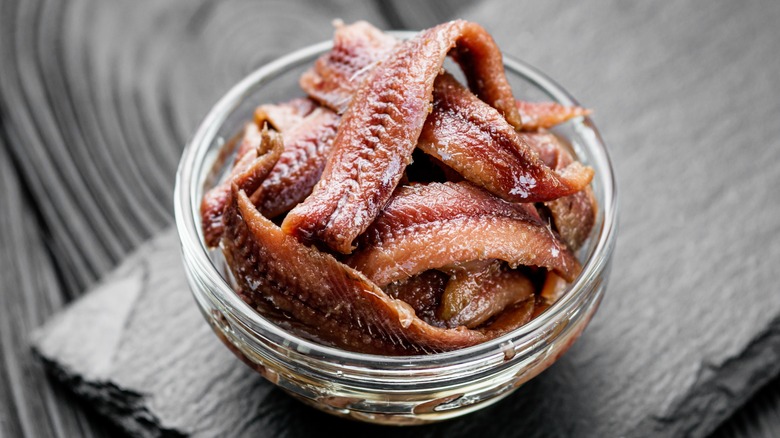Why Mario Carbone Wants You To Think About Anchovies In A Different Light
There might be few food ingredients as controversial as anchovies. Much like pineapple, anchovies' eligibility as a pizza topping is highly controversial, per Pizza Bien. Folks seem to either love or hate these briny little fish, and the opposing argument is futile against those feelings.
Why are anchovies considered to be a pantry staple for many top chefs, then? Nancy Silverton keeps them on hand along with similarly salty ingredients like olives and capers. Celebrity Chef Mario Carbone similarly told Vogue that he sees them as one of the most underrated ingredients to transform a dish. Carbone should know too, his Major Food Group has become one of the biggest restaurant empires in the world with more than 30 locations including his namesake Carbone restaurant.
Town & Country Magazine claims that anchovies and other tinned fish have seen a return to the spotlight in recent years. So, if you've never eaten anchovies, or had them once and never tried them again, now might just be the perfect time to heed Carbone's advice, and jump on the anchovy bandwagon.
The history of anchovies as food
While anchovies may be a somewhat controversial food to modern diners, their culinary use dates back several millennia. According to Cooking Chew, there are references to cooking with anchovies from 3,000 years ago. Anchovies are tiny, one to two-inch fish that are caught in nets while they swim in dense schools. Today, they are most often then deboned and brined for easy consumption, but that wasn't always the preferred method.
Cooking Chew notes that the ancient Greeks popularized a condiment called garum. This fermented fish sauce then migrated to the Roman empire where it became a commonly used sauce like ketchup, and a replacement for salt in many dishes, per SFGATE.
Today, the practice of catching and processing these tiny fish is still common. Smithsonian Magazine reports that this is especially true in the "Anchovy Coast" of southern Spain and France, while NPR points out that anchovies are still used to make the many fish sauces common in Asian cooking, and also add a kick to Thai fried chicken.
Why anchovies are better than you think
So, what is the secret to these miniscule fish that has given them such lasting power through the centuries? According to Mario Carbone via Vogue, the most compelling reason is that anchovies can tap into the magical fifth taste known as "umami." Ajinomoto says that the taste buds for this flavor were only discovered in 2002, and are most easily described as savory. To be as specific as possible though, umami is a more poetic name for the taste of glutamate. Healthline says that foods like tomatoes, roast meats, and aged cheeses all contain this highly sought-after flavor.
Carbone says that anchovies contain glutamate, and can easily be added to a dish to contribute those complex notes of savory umami. It helps to think of anchovy as more of an umami booster as opposed to a source of fishy or salty flavors. Anchovies accomplish as much in the Japanese broth known as dashi, and can easily be added to a tomato sauce or pasta recipe as well.
So, the next time you're struggling to lock down a rich, savory flavor in a sauce, soup, or other dishes, look to the humble anchovy.


